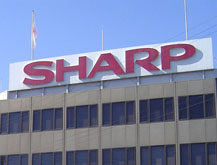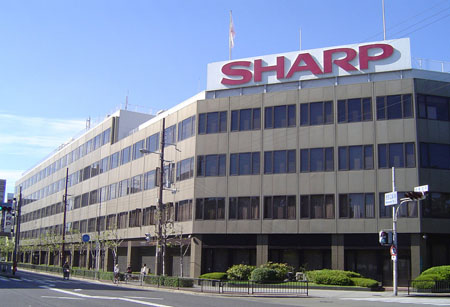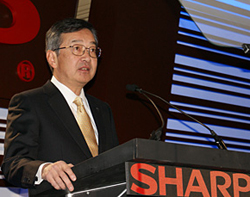Now Sharp looks to China for a way out of its woes
New deal will see cutting-edge IGZO technology licensed to Chinese state-run company for a minority stake in LCD panel joint venture


UPDATE
The latest twist in the ongoing saga of Sharp's financial woes sees the Japanese firm entering into a joint venture with a state-owned Chinese company to manufacture LCD panels at a site in Nanjing.
The new venture will see Sharp licensing its state-of-the-art IGZO (indium-gallium-zinc oxide) panel technology – to China Electronics Corp in return for a stake of just 8% in the new joint venture. The joint venture will be capitalised at 17.5bn yuan (£1.86bn), with Sharp investing just ¥22bn (£146m) into the deal, taken from the licensing fees it will receive from the venture.
A plant will be built in Nanjing to make both LCD TV panels and IGZO panels for computers, tablets and smartphones. Due to be onstream midway through 2015, the facility will be two-thirds the size of Sharp's flagship display factory in Japan, Kameyama No 2, and will have an initial capacity of 480,000 46in TV panels, or 7.2m 10in tablet screens, per month.

In connected moves, a general shareholders meeting held in Osaka on Tuesday saw Takashi Okuda, who became president of Sharp in April last year, ousted in favour of executive vice president Kozo Takahashi (left).
Although the move had been announced before the meeting, that's still a very rapid turnaround, given that Sharp has previously only had six presidents in its 100-year history.
Okuda, who apologised to shareholders at the meeting for no living up to their expectations, now becomes chairman, but without a seat on the Sharp board, replacing Mikio Katayama, whose position becomes 'senior executive fellow in charge of technology'.
Get the What Hi-Fi? Newsletter
The latest hi-fi, home cinema and tech news, reviews, buying advice and deals, direct to your inbox.
Former Sharp presidents Katsuhiko Machida and Haruo Tsuji remain as special advisors.
OPINION
While co-operations like this are almost inevitable given Sharp's current plight – it lost well over £1bn on its LCD panel business, the technology for which it is best-known, last year – it's hard to see this latest announcement as anything more than a desperate roll of the dice for the 100-year-old Japanese company.
Yes, this may be the only way Sharp can stay in the LCD panel business, but it does seem to be all but giving away its most precious asset, the power-saving IGZO technology, around which it's already signed another deal for the supply of panels to Samsung, once regarded as one of Sharp's main competitors in this field. The two now have a joint venture making panels in Japan.
Given the amount of debt Sharp is carrying, however, it has been finding it difficult to get funding to expand its way out of its troubles by increasing production, which is what it needs if it's to increase sales and get the display business back in the black, as promised in its most recent management plan.
China Electronics, which has the advantages of cost-effective production and the financial might of the Chinese government behind it, could be Sharp's only hope of staying in business.
POSTED 24.06.13
US-based chipmaker Qualcomm has completed the second stage of its $120m investment in Sharp, delayed while the Japanese company met the terms set for the cash injection. The completion of the deal makes Qualcomm Sharp's third-largest shareholder, with a stake of around 3.5%.
Qualcomm originally announced its intention to invest in Sharp last December, the deal concerning joint development of Micro ElectroMechanical System, or MEMs, displays. The technology uses minute mechanical shutters for each pixel, opening and closing to display colours, and promises to offer greater energy-efficiency than existing LCD displays.
However, after Qualcomm made the initial investment of $60m following the announcement of the deal, Sharp said in March that it wouldn't be able to meet the conditions agreed, which concerned the achievement of 'certain technical milestones'. The MEMS technology is understood to be exceptionally difficult to manufacture.
However, it seems the two have now reached agreement, and a statement issued today by Sharp says that 'the subscription payment was fully made'.
POSTED 26.03.13
Sharp says it's looking for new investors to help it escape its precarious financial plight, after the deadline for a deal with Taiwanese contract electronics manufacturer Hon Hai passed today with no agreement.
Citing an inability to get 'regulatory approval' for the deal with Hon Hai, Sharp has now said it no longer expects an immediate investment from the Taiwanese company, better known as Foxconn: company spokeswoman Miyuki Nakayama said that 'We will still continue talks with Hon Hai, but we will look at all possible fundraising methods as well.'
Hon Hai had planned to invest ¥66.9bn (£468m) in the Japanese company, but since initial discussions last March the Taiwanese giant backed down due to Sharp's poor earnings forecasts, and tumbling share price.
The initial deal would have seen Hon Hai getting a 9.9% stake in Sharp, and was based on a share price of ¥550, but as the Sharp share price fell, Hon Hai boss Terry Gou sought to renegotiate, seeking either to pay less for the 121m new Sharp shares involved in the deal, or receive a larger stake in the company for the same investment.
At one point last year the Sharp shares were down at ¥142, which would have reduced their value to Hon Hai to just over ¥17bn, or conversely mean the investment initially discussed could have bought Hon Hai 552m shares, potentially giving it a 45% stake in Sharp.
But as previously reported, Sharp wasn't budging from its initial figures, and as the discussion period dragged on towards today's deadline, no progress was made.
In the meantime Sharp accepted a ¥10.4bn (£72m) investment from Samsung, in return for a 3% stake, and a two-stage investment on a similar scale from US semiconductor company Qualcomm.
Sharp is facing a loss of around ¥450bn in the financial year ending this weekend, and its shares are trading at little above half their value this time last year, closing today at ¥290.
It desperately needs to turn around its loss-making LCD TV panel factories and convert them to making more profitable small-device displays as part of its survival strategy, but has now said it will have to review the amount it has available to spend on new technologies.
Hon Hai: 'we're still negotiating'
Hon Hai, which was said to be less than delighted with the deal Sharp earlier struck with Samsung, has denied that the deal is off: it says 'According to the pact signed on March 27, 2012, the agreement is effective for three years and will not expire until March 26, 2015.
'Top executives from the two sides discussed the investment deal in a sincere manner for five hours on March 24, during which the direction of future co-operation has been fixed.'
Hon Hai runs a large LCD TV panel factory in Sakai, Japan, jointly with Sharp – an arrangement that's expected to continue – , and there are suggestions Sharp may sell its factory in Mexico to Hon Hai, while also offloading its Chinese TV assembly plant to Lenovo.
Those disposals would be part of a schedule of asset sell-offs designed to help it meet some of its impending liabilities, including interest payments on its debts and the repayment of a $2.1bn bond, due in September.
ANALYSIS: Is its Samsung deal Sharp's smartest move, or just a sign of desperation?
Written by Andrew Everard
Andrew has written about audio and video products for the past 20+ years, and been a consumer journalist for more than 30 years, starting his career on camera magazines. Andrew has contributed to titles including What Hi-Fi?, Gramophone, Jazzwise and Hi-Fi Critic, Hi-Fi News & Record Review and Hi-Fi Choice. I’ve also written for a number of non-specialist and overseas magazines.
